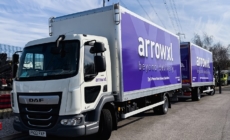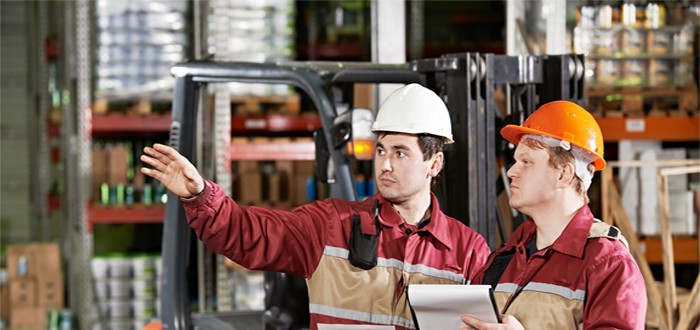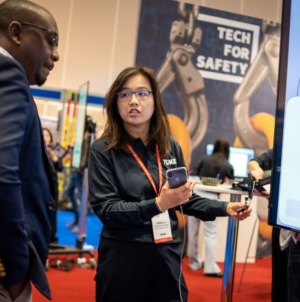-
ROSSLARE EUROPORT TARGETS HEALTH & SAFETY WITH CAMERA TELEMATICS PARTNERSHIP - 2 days ago
-
Landmark Study Reveals Wearable Robotics Significantly Boost Safety and Efficiency in Industrial Environments - July 24, 2024
-
Visku Tackle The Retail Seasonality Challenge One Pallet At A Time - July 22, 2024
-
KAMMAC AND BERGEN LOGISTICS STRENGTHEN FASHION & LIFESTYLE SERVICES IN THE UK - July 19, 2024
-
TENTBOX EXTENDS PARTNERSHIP WITH ARROWXL TO SUPPORT INCREASING DEMAND - July 17, 2024
-
The Perfume Shop improves customer journeys while driving profitability in partnership with Scurri - July 17, 2024
-
ZEROMISSION SECURES £2.3M ($3M) INVESTMENT TO ACCELERATE ELECTRIC FLEETS - July 16, 2024
-
BCMPA CELEBRATES SUCCESS OF 2024 CONFERENCE - July 15, 2024
-
Best of the Best: Jungheinrich Celebrates Triple International Award Win - July 12, 2024
-
GOPLASTICPALLETS.COM CALLS ON NEW CHANCELLOR RACHEL REEVES TO CONSIDER PLASTIC PACKAGING TAX REFORM - July 10, 2024
BITA warns against forklift truck modifications.
BITA and FLTA warn that unauthorised modifications can endanger staff and invalidate warranties
Forklift truck modifications are offered by many companies and are widely advertised, but they are far from risk free – and can have consequences for health and safety and invalidation of warranties.
BITA Secretary-General James Clark explains: “A recent presentation to our Truck Suppliers Group (TSG) clearly demonstrated the risks and dangers behind unauthorised modifications, making the point that
assessment and implementation of truck modifications is a skilled task requiring detailed and specialised engineering knowledge.”
Truck modifications that are not factory approved may affect capacity, stability or safety requirements. Companies making modifications do not realise the consequences, or are not aware of their responsibilities and liabilities, should something go wrong with a modification at a later date.
There is a very clear standard for the safety requirements of industrial trucks, BS EN ISO 3691-1:2015, which states in paragraph 6.2.7.1 that ‘unauthorised truck modification is not permitted’.
“It’s not as if the regulations are hard to understand”, continues Clark. “However only the most cursory web search is required to identify companies advertising modification changes to forklift trucks, as if this were normal practice and presented no safety hazards whatsoever.”
But it isn’t only BITA that is concerned about such modifications. Fellow industry body the Fork Lift Truck Association (FLTA) is equally concerned: “This is an important industry-wide issue, and is especially important when trucks are leased,” said Peter Harvey MBE, FLTA Chief Executive.
“Unauthorised modifications or repairs – even changing tyres – could invalidate rental contracts or manufacturer warranties, leaving users to foot repair bills. So it is crucial that those utilising lift trucks understand what they can and cannot do. Failure to do so puts them at risk of unexpected repair bills and much more. Before making any changes to the original equipment customers must consult the manufacturer or authorised dealer.”
Examples of modifications commonly being offered include mast reductions, drive-in racking modifications, and perhaps most disturbingly, truck head guard modifications. BITA’s TSG has been provided with some examples of real concern:
· A cab-pillar section was removed and re-welded as part of a drive in racking modification. Without knowledge of the exact material grade used in manufacture, it would be difficult or impossible to certify the welding and it is extremely doubtful whether the modification would pass an ISO 6055 impact test
· A counterbalance truck fitted with extended 15ft-long forks, dangerously reducing stability
· Fork-mounted ‘safe’ access platforms, advertised as though permitted for routine use
· Hoists mounted to overhead guards, reducing strength, impeding operator visibility, and applying loads outside the design limits
These are just a few examples, in addition there are more ‘informal’ modifications such as adding additional weight (in the form of drums full of water or toolboxes filled with concrete) to increase the lifting capacity of counterbalance trucks.
“We are sure there are many more examples out there, and accidents and deaths have been linked to making unauthorised modifications that affect the safe operation of trucks”, adds Clark. “Those undertaking such work should understand that, depending on the modification, they may have inadvertently taken on the responsibilities of being the equipment manufacturer, with all the risks of prosecution and redress this entails.
“Modification of a forklift truck without the manufacturer’s approval could invalidate the warranty and the CE marking, making it difficult if not impossible to re-sell elsewhere. This is an issue to which, as an organisation which cares deeply about safety at all levels, causes us great concern”, concludes Clark.

































